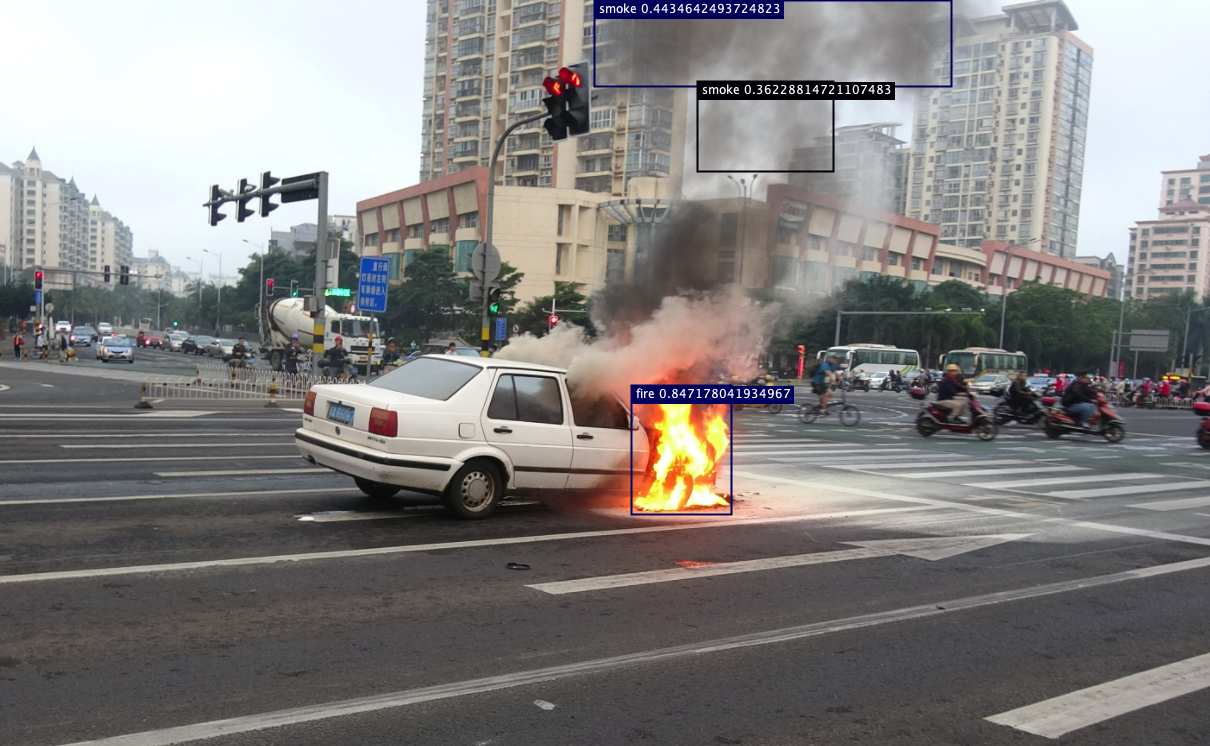mirror of
https://gitee.com/mymagicpower/AIAS.git
synced 2024-12-02 04:08:21 +08:00
| .. | ||
| build/output | ||
| models | ||
| src | ||
| fire_smoke_sdk.iml | ||
| pom_win_gpu.xml | ||
| pom.xml | ||
| README_cn.md | ||
| README.md | ||
Download the model and place it in the models directory
Fire Detection SDK
Supports smoke-fire detection.
SDK Features
- Fire and smoke detection with bounding box and confidence level
- Supports two categories:
- fire
- smoke
运行例子 - FireSmokeDetectExample
After running successfully, the command line should display the following information:
[INFO ] - [
class: "fire 0.847178041934967", probability: 0.84717, bounds: [x=0.522, y=0.516, width=0.083, height=0.173]
class: "smoke 0.4434642493724823", probability: 0.44346, bounds: [x=0.492, y=0.000, width=0.295, height=0.116]
class: "smoke 0.36228814721107483", probability: 0.36228, bounds: [x=0.576, y=0.110, width=0.113, height=0.121]
]
Open-source Algorithm
1. Open-source algorithm used in the SDK
2. How to export the model?
-
Export the model (Note: pytorch models are different for CPU and GPU, so they should be exported separately)
-
torch.device('cpu')
-
torch.device('gpu')
"""Exports a YOLOv5 *.pt model to ONNX and TorchScript formats
Usage:
$ export PYTHONPATH="$PWD" && python models/export.py --weights ./weights/yolov5s.pt --img 640 --batch 1
"""
import argparse
import torch
from utils.google_utils import attempt_download
if __name__ == '__main__':
parser = argparse.ArgumentParser()
parser.add_argument('--weights', type=str, default='./best.pt', help='weights path')
parser.add_argument('--img-size', nargs='+', type=int, default=[640, 640], help='image size')
parser.add_argument('--batch-size', type=int, default=1, help='batch size')
parser.add_argument('--augment', action='store_true', help='augmented inference')
opt = parser.parse_args()
opt.img_size *= 2 if len(opt.img_size) == 1 else 1 # expand
print(opt)
# Input
img = torch.zeros((opt.batch_size, 3, *opt.img_size)) # image size(1,3,320,192) iDetection
# Load PyTorch model
attempt_download(opt.weights)
model = torch.load(opt.weights, map_location=torch.device('cpu'))['model'].float()
model.eval()
model.model[-1].export = False # set Detect() layer export=True
if img.ndimension() == 3:
img = img.unsqueeze(0)
y = model(img) # dry run
# TorchScript export
try:
print('\nStarting TorchScript export with torch %s...' % torch.__version__)
f = opt.weights.replace('.pt', '.torchscript.pt') # filename
ts = torch.jit.trace(model, img)
ts.save(f)
print('TorchScript export success, saved as %s' % f)
except Exception as e:
print('TorchScript export failure: %s' % e)
# # ONNX export
# try:
# import onnx
#
# print('\nStarting ONNX export with onnx %s...' % onnx.__version__)
# f = opt.weights.replace('.pt', '.onnx') # filename
# model.fuse() # only for ONNX
# torch.onnx.export(model, img, f, verbose=False, opset_version=12, input_names=['images'],
# output_names=['classes', 'boxes'] if y is None else ['output'])
#
# # Checks
# onnx_model = onnx.load(f) # load onnx model
# onnx.checker.check_model(onnx_model) # check onnx model
# print(onnx.helper.printable_graph(onnx_model.graph)) # print a human readable model
# print('ONNX export success, saved as %s' % f)
# except Exception as e:
# print('ONNX export failure: %s' % e)
#
# # CoreML export
# try:
# import coremltools as ct
#
# print('\nStarting CoreML export with coremltools %s...' % ct.__version__)
# # convert model from torchscript and apply pixel scaling as per detect.py
# model = ct.convert(ts, inputs=[ct.ImageType(name='images', shape=img.shape, scale=1 / 255.0, bias=[0, 0, 0])])
# f = opt.weights.replace('.pt', '.mlmodel') # filename
# model.save(f)
# print('CoreML export success, saved as %s' % f)
# except Exception as e:
# print('CoreML export failure: %s' % e)
# Finish
print('\nExport complete. Visualize with https://github.com/lutzroeder/netron.')
